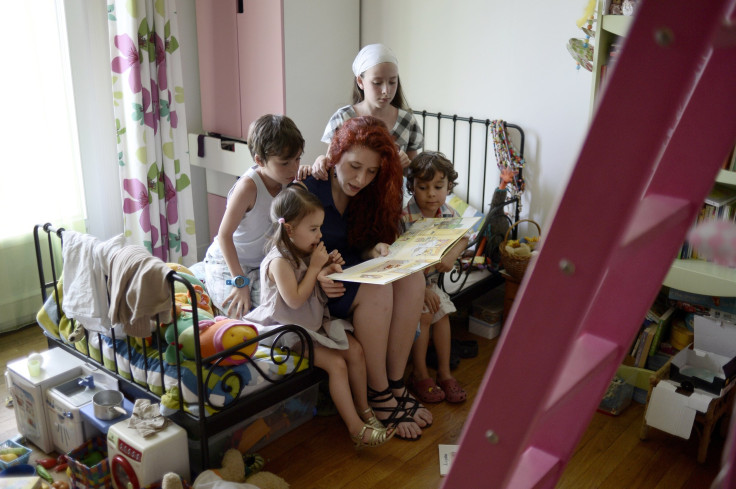Au Pair Lawsuit Accuses Sponsors Of Minimum Wage Violations, Illegal Price Fixing

Bella Deetlefs was reading the local job listings in her hometown of Cape Town, South Africa, when she decided to apply for an au pair gig in the United States. “It seemed very interesting,” she says, and the “traveling was a big bonus to me.”
A couple months later, Deetlefs, then 23, arrived in New York City for training with her sponsoring agency, Culture Care. Then it was on to Salt Lake City, where she stayed for almost a year.
In the end, she does not recommend it. “It was pretty different than how they described it,” Deetlefs says. “It was a real eye-opening experience.”
Cultural rewards were hard to find. Deetlefs spent little time with the family when she wasn’t cleaning, cooking or looking after their three children, working 35- to 40-hour weeks. She feels misled about the pay, too. She says Culture Care told her she’d earn overtime pay and that her compensation would be tax-free. Neither was true. She also says the agency suggested she'd be making more than her weekly stipend -- $195.75, or about $4.35 an hour. Jeffrey Allen, a lawyer representing the company, denies those allegations but defends the amount of the stipend.
If that number sounds suspiciously low, it is. That's because in the eyes of Culture Care and the 14 other State Department-certified agencies that together place about 12,000 au pairs in the United States each year, Deetlefs and others aren’t entitled to the standard minimum wage or other protections. Now, that stance has triggered an unprecedented class-action lawsuit.

A French Phrase, Signifying Nothing?
The lawsuit, filed last November, is making its way through federal court. It accuses the 15 agencies that oversee the exchange programs of undercutting minimum-wage laws, colluding to set illegal wage rates, and misleading au pairs about pay practices. The companies have tried to get the case dimisssed. But last week, lawyers representing Deetlefs and others responsed in a brief, arguing the suit is “necessary to protect the integrity of the au pair program and to enforce the laws that govern it.”
“Au pair” in French means “on equal terms.” The noun comes from early descriptions in post-war Europe of an exchange that arose between young foreign women looking for meaningful life and work experience and families in need of childcare. But labor advocates today say the nature of the relationship betrays the term’s roots.
Au pairs come to the United States on the nonimmigrant J-1 visa, crafted in the 1960s to promote “mutual understanding” between the U.S. and foreign countries through “educational and cultural exchanges.” Private agencies match au pairs with families, who in turn provide room, board and a weekly stipend. (Au pairs themselves pay the sponsors for the service; Deetlefs says she paid about $800 out of pocket.)
Of course, Americans who hire au pairs aren’t doing it for the cultural enrichment alone. The arrangement gives them domestic labor, too. Some doubt the program’s cultural value altogether.
Nina DiSalvo, executive director of the Colorado nonprofit Towards Justice -- the public interest group that filed the suit after it was approached last year by a disgruntled au pair from Colombia -- says that in the absence of affordable childcare options, the au pair program has been “converted into a work program” and “turned into an exploitative program” -- in other words, a kind of cheap alternative to a traditional nanny or childcare center.
Since the sponsoring agencies generate revenue when families are matched with au pairs, the firms have an interest in keeping labor costs low and the program attractive, she says.
A High-Stakes Lawsuit
At the core of the lawsuit is how much au pairs should be paid. The current industrywide rate comes from a 2009 State Department bulletin. Sponsors say they’re just following that mandate. One of the lawyers representing au pairs, Matthew Schwartz, says that figure was a mistake and is superseded by obligations under the Fair Labor Standards Act.
Schwartz says the Department of Labor has acknowledged as much. The State Department too stipulates compliance with all state and local minimum-wage laws. An agency pamphlet specifies that nonimmigrant visa holders are entitled to “at least the federal legal minimum wage” of $7.25 and overtime pay eligibility. Since the lawsuit was filed, the State Department has gone so far as to remove the reference to the weekly stipend from its website. The agency did not respond to a request for comment.
The lawsuit also accuses the sponsor agencies of violating antitrust law by agreeing to fix weekly stipends at a common rate. The firms have agreed not to deviate from that figure, according to the lawsuit, and that constitutes a “price-fixing conspiracy.”
Lawyer Jeffrey Allen insists Culture Care isn’t breaking the law. “That’s the last written directive,” he says of the $195.75 rate. “It has not been replaced by any other figure.”
Depending on how things shake out in court, au pairs could potentially net tens of thousands each in damages, Schwartz says. The suit also asks for a declaratory judgment -- something that could force the sponsors to change their business practices and reshape the labor arrangements of the entire program. Still, a final resolution remains several months, if not years away.
“Fundamentally,” DiSalvo says, “we’re trying to enforce the rights of our clients and get them the pay and rights they deserve.”
© Copyright IBTimes 2024. All rights reserved.






















